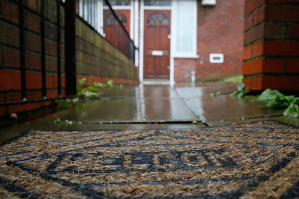
The ISIS militant known as "Jihadi John" has sent a letter to his parents apologizing for shaming his family, but expressed no remorse for the beheadings he supposedly conducted on video.
According to a report in Jerusalem Post, Mohammed Emwazi apologized to his family for "problems and trouble the revelation of his identity has caused." The apology was first reported by Hala Jaber, Josh Boswell and Richard Kerbaj of the Sunday Times (paywall).
"Emwazi has not expressed any remorse for his barbaric actions, however, which have included the apparent beheading on camera of a number of western hostages, including two British aid workers," Jaber, Boswell and Kerbaj wrote.
The Sunday Times added that Emwazi conveyed his message of regret from Syria via a third party. His identity was revealed as Jihadi John back on Feb. 26, according to Jerusalem Post.
"The Londoner's family, who are originally from Kuwait, have been forced into hiding after Emwazi was named as Jihadi John," Jaber, Boswell and Kerbaj wrote. "His mother, Ghaneya, and four of his five siblings are said to be under police protection."
The Jerusalem Post reported that the cost of police protection for Emwazi's family in the United Kingdom has cost £5,000 (approximately $7,600 US) daily. His father, along with another sister, has lived in Kuwait for the past two years.
The Jerusalem Post described how Emwazi received the nickname of Jihadi John, who was dressed entirely in black and wore a holster under his left arm in videos depicting brutal ISIS executions.
"Hostages gave him the name John as he and other Britons had been nicknamed the Beatles, another was dubbed George," Jerusalem Post wrote.
The Jerusalem Post added that lawyers representing Emwazi's father continued to insist that Emwazi is not the person behind the ISIS videos. However, a report from Agence France-Presse stated that one of the lawyers has withdrawn from the case on Sunday.
"I have decided to withdraw from the case for personal reasons," Salem al-Hashash said in a news conference that lasted just a few minutes.
AFP reported that he provided no further details and refused to answer questions. Hashash was originally hired last week by Emwazi's father, Jassem, to file cases against those who supposedly spread false rumors about the Emwazi family.
"Hashash did not say what will happen to the lawsuits he has filed now that he has withdrawn from the case," AFP wrote.
According to AFP, Hashash stuck with his original assertion before withdrawing from the case, arguing that Emwazi's father was a "British national who has no relation with Kuwait." He also insisted that "Western security agencies have not provided any evidence to prove that Mohammed Emwazi is Jihadi John."






